Noisy pipes can be quite a nuisance in any home or business.
Apart from the inconvenience of unpleasant sound, noise pollution can contribute to increased stress and irritability when left unresolved.
Luckily, being able to soundproof your pipes will provide a practical and cost-effective solution for this issue.
In this guide, we cover everything you need to know about how to soundproof a pipe so that you can restore a peaceful ambiance in your home.
Keep reading to learn more about the cause of noisy water pipes and what you can do about it.
Getting Started: Planning & Preparation
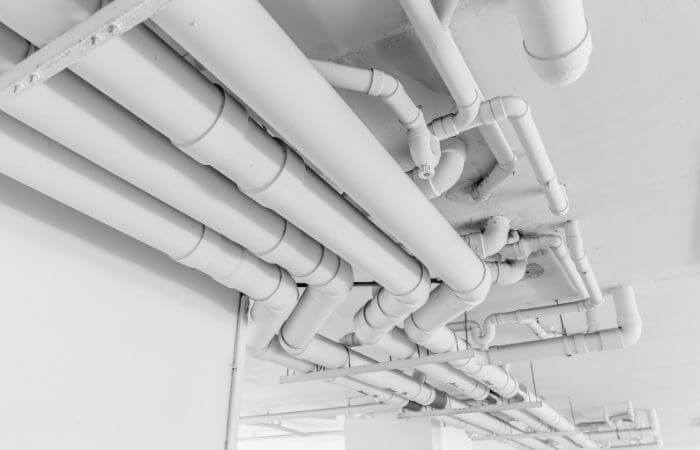
Soundproofing a pipe can be confusing, so it’s important to have a carefully laid-out plan to get things rolling.
We recommend creating a checklist of tasks to stay organized in your pipe soundproofing project.
Here are the key steps to consider in the soundproof planning process:
- Determine the cause of the noisy pipe.
- Observe and take note of which rooms are affected by the noise.
- Find out what type of pipe is used in the plumbing system.
- Select the best soundproofing materials from this guide based on your home assessment.
- Prepare or buy the appropriate materials and tools (self-adhesive, utility knife, drywall filler, heavy-duty glue, etc.).
What Are The Common Causes Of Noisy Pipes?
Noisy pipes are usually caused by water pressure vibration, liquid in the air chamber, or loose piping.
Whenever vibration occurs within or between objects, sound is produced. In other words, noisy pipes are either caused by the running water that travels within the pipe itself or due to the pipes rubbing against each other.
Different Types Of Pipe Noises
Pipes produce different types of noises depending on several factors like water pressure or loose piping.
By closely observing the specific type of noise that your house pipes make, you can determine the source of the problem and find an appropriate solution.
Here’s what you need to know about the two most common types of pipe noises: breakout noise and radiant noise.
Breakout Noise
This type of pipe noise is due to the movement of water within the pipes.
An example of pipe noise under this category is a water hammer which results from water being trapped in the air chamber.
Water hammer tends to create loud thud due to the sudden halt of flowing water or pressure surge within the pipe.
Generally, the recommended solution to this problem is as simple as adjusting the water pressure since it may be too strong.
However, if the noise persists even with the pipes properly installed then you may consider other options to soundproof the pipes instead.
Radiant Noise
Radiant noise is usually produced by pipes or water supply lines that are built closely together.
This noise is more common in older homes where pipes are more likely to be worn out.
While some homeowners prefer to replace pipes to resolve this issue, there are effective options for soundproofing such as using acoustic lagging or mass loaded vinyl.
How The Location Of Pipes Contributes To Noise
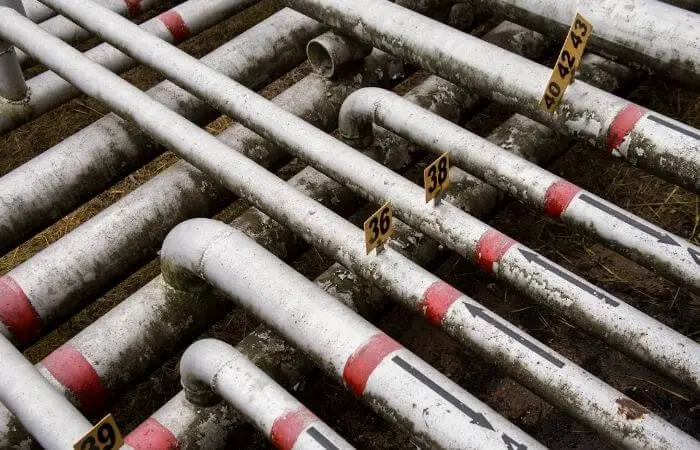
Most people are surprised to learn that the location of the pipes within their homes is a major contributor to the degree of noise that they hear.
For instance, pipes that travel through the wall of a closet will be much quieter than pipes that operate within the living room walls.
Determining how the piping system in your home is constructed is helpful information before beginning your pipe soundproofing project.
This is because it gives you the option to either replace some pipes, install drywall, or only add soundproofing material around the pipes in certain rooms where a quiet ambiance is preferred.
Types Of Pipes & Their Noise Level
Once you’ve established where the pipes are located, you’ll need to find out which type of pipes are installed in your home plumbing system.
It’s important not to overlook the material of pipes since they may contribute to radiant noise issues.
Here’s a quick rundown of the different types of pipes and their corresponding noise level!
Cast Iron Drain Pipes
These are high-quality pipes that are among the quietest types but it can be difficult to repair and quite costly.
You may consider only using cast iron drain pipes in the living room or bedrooms where the noise level should be kept at a minimum.
Copper Pipes
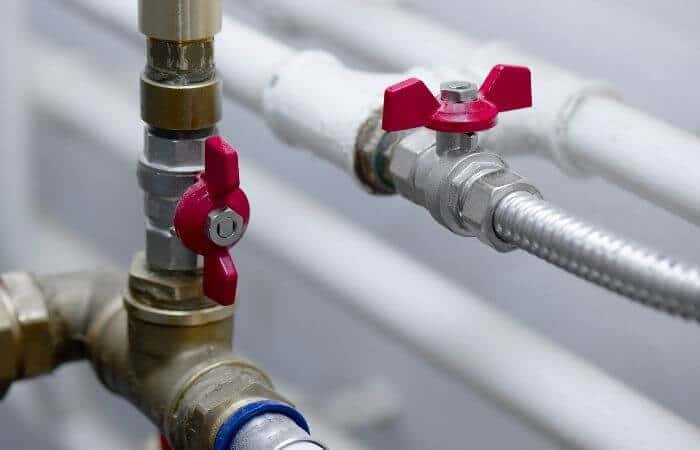
Copper piping systems tend to be noisy since it poorly adjusts to changes in temperature.
It also has a tendency to rub against neighboring pipes when it transports hot water which creates an unpleasant clanking noise.
PVC Drain Pipes
These plastic PVC drain pipes may be quiet but only when they are installed correctly.
PVC pipes need space between each other since they tend to expand significantly with hot water and contract as they cool down.
To reduce the noise caused by this issue, PVC drain pipes need to be adequately spaced out which may require professional construction.
Best Soundproofing Materials For Pipes
To help you get started on your pipe soundproofing project, we listed the best soundproofing materials to use for decreasing the sounds of noisy pipes in your home.
We also included instructions on how to soundproof a pipe with each of the following materials.
1. Acoustic Lagging
With its ability to absorb sound and create a cushioned barrier against the wall cavity, acoustic lagging works optimally for noise reduction.
To install this, you’ll need to use a tape measure and get the dimensions of the pipe/s that you’d like to soundproof.
Next, you’ll need to cut the acoustic lagging accordingly and glue it onto the pipe in several sections until you’ve covered the entire pipe.
2. Spray Foam Insulation
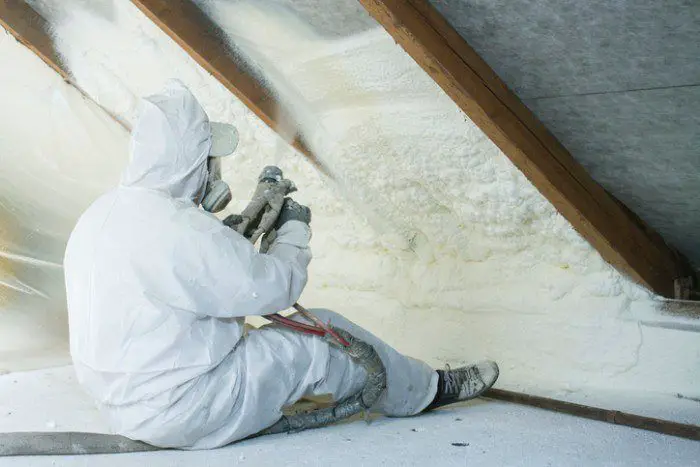
For a quick and easy fix, consider using spray foam insulation for your pipes.
Although it isn’t as effective at reducing noise as acoustic lagging, it works well for low-moderate noises.
On top of that, it improves insulation around the home by keeping the temperature more stable.
To use this, simply apply the spray along the entire surface of the pipe.
Once it dries, the product will thicken which will muffle the sound caused by any pipe vibrations.
3. Mass Loaded Vinyl
Mass loaded vinyl is a highly-dense, flexible, and massive material that significantly reduces noise.
It functions as a physical soundproof barrier by preventing sound waves from passing through it.
The installation process is similar to acoustic lagging where you cut out sections of the material and glue it around the pipe that you’d like to soundproof.
4. Acoustic Pipe Wraps
An acoustic pipe wrap contains heat-resistant and noise-reducing properties.
Similar to spray foam insulation, it’s not as effective as heavy-duty soundproofing materials but they can still provide extremely sound insulation.
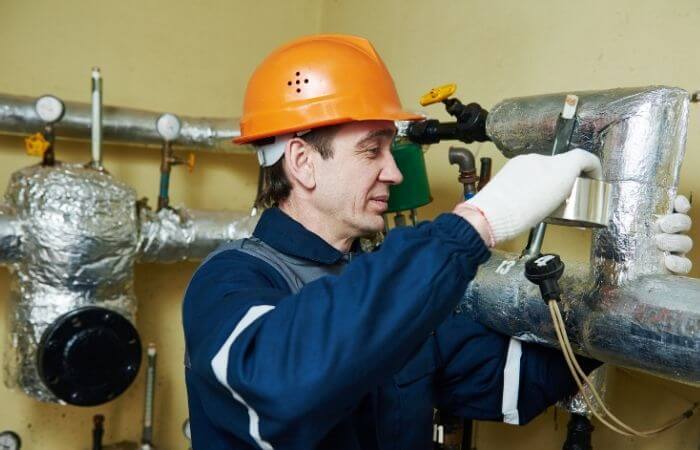
They are an attractive solution for anyone who wants to get the job done quickly since all you need to do is wrap the material around each pipe securely.
5. Drywall or Gypsum Board Installation
If your water supply pipes aren’t accessible, a viable option is to add a layer of drywall or gypsum board with sound dampening material like foam panels.
Creating this additional layer muffles water transmission within the pipes and ensures reduced noise.
Unfortunately, you’re likely to need help from a professional since this requires more advanced building skills and construction knowledge.
6. Rubber Spacers
Rubber spacers are ideal for eliminating noisy sounds caused by loose PVC pipes.
By attaching these to the joints of connecting water pipes, the rattling sounds are reduced due to the rubber absorbing the vibration.
Rubber spacers also decrease the movement of an operating PVC pipe by making sure that it’s securely locked in place.
Tips For Soundproofing Pipes
House soundproofing projects usually take a lot of planning.
Although it may seem intimidating at first, it can be quite rewarding once you get the hang of it.
Here are some helpful tips to consider before the soundproofing process:
- Some pipe soundproofing products are flammable. Make sure that you choose soundproofing materials or products that are certified as heat-resistant.
- Combine different types of pipes to cut down on costs. For example, only replace noisy pipes like copper with the more quiet cast iron drain pipes in rooms that require minimal noise.
- Ask for help from friends or other household members. While soundproofing pipes can be done single-handedly, it’s more efficient to have some assistance in measuring, cutting, and installing the materials.
- Consider soundproofing both the pipes and walls to optimize the overall sound reduction. Installing a thicker barrier is a great way to prevent sound from going through the walls.
When To Hire A Professional To Help You Soundproof Your Pipes
If the noise issue persists after attempting to soundproof your water pipes, it may be time to consult a professional.
It’s possible that there may be an underlying internal issue in the system of water pipes or within the plumbing house structure that requires repair.
It’s best to address this as soon as possible to prevent encountering a future problem.
For individuals moving into a new home, it’s important to make sure to add soundproofing on the agenda in the renovation or construction process.
This way, you can make sure that any issues in the drainage system, wall cavities, or any part of the house are addressed prior to moving in.
The Benefits Of Soundproofing Pipes
Soundproofing pipes to eliminate unwanted noise comes with a host of benefits.
Apart from restoring a peaceful ambiance, homes that are soundproof tend to have improved heat insulation which can significantly cut down on electrical costs.
Additionally, soundproofing raises property value since it makes the living space more appealing to potential buyers.
This is particularly helpful for anyone looking to sell their home in the future since the soundproofing project may be considered an investment.
Lastly, studies have found that consistent exposure to noise is linked to greater irritability, decreased sleep quality, and hearing impairment.
Soundproofing helps alleviate any induced stress from sound disturbances present in the home which allows household members to enjoy the convenience of a quiet space.
Start Soundproofing Today
With a ton of practical options on how to soundproof a pipe, there’s no reason to settle for the inconvenience of a noisy home.
While it takes time to complete a soundproofing project, proper preparation and adequate information will ensure the best results in resolving any unpleasant sounds.
